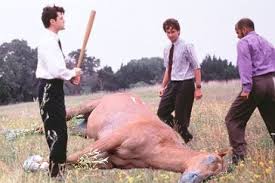Had the first session of a MA class I'm auditing on Anglican Theological Identity today; it was a good start but highlighted a serious flaw. (Apologies to any English Anglicans reading...) The Church of England actually finds it hard to speak of Anglicanism; the colonials present (Australian, American, New Zealand) seem to have much sharper sense of a distinctive Anglican identity, even if we don't agree on the features of that identity. What does it mean to be an Anglican Christian?
The problem is like the above picture - too many monkeys!!! (No offence to anyone at the seminar today.) In practice its very hard to talk about Anglican
theological identity - often whats discussed isn't theological but historical or experiential. Yes, I'm aware that church history is sometimes regarded as as the history of doctrines; what I mean is how to define Anglicanism by its distinctive theology not merely by its history? Lots of people want to talk about my subjective experience of being Anglican rather than talking about its theological distinctives.

This is a horse I've been laying into for some time and see no reason to stop now; why is it we're so reticent to accept the theology of the 39 Articles, the Prayer Book, and the Ordinal? If you're ordained (as I am) you're asked by your Bishop to subscribe to these things. For many this seems to be wink-wink, nudge-nudge... Oh yes, I subscribe to the 39 Articles - but I don't believe in them. Many pew perching Anglicans may not even know that we have a doctrinal statement (or have never been sufficently bored by a sermon to surf the Prayer Book). But they are there. They are official. And they don't seem to be going away. They may not have the size of the Westminster Confession, but they are as J.I. Packer says of a confessioinal nature. Yes, they go beyond theology into the polity of the era they were composed it, but they are still for the greater part theological in nature.
Some have pointed out that Anglican theology isn't so much confessional as it is liturgical. In some cases this is little more than an attempt to obfiscate the formularies (the 39 Articles, etc...). But there is a sense in which this is also true - we enact our theology of the atonement when we join in the words of the Great Thanksgiving which draws our attention to Jesus' death as 'full, perfect and sufficient sacrifice, oblation and satisfaction for the sins of the world'. Anglican liturgy is mean to be didactic - it teaches us about the 'faith delivered once for all to the saints' (Jude v3). We learn to live as justified sinners called to new life in Jesus in the weekly communal call to repentance and assurance of God's forgiveness. We learn to come under God's rule through hearing the Bible read and proclaimed. At its best Anglican liturgy is gospel shaped. There is of course much more to being a Christian than a weekly meeting, but what we do in that meeting should further our discipleship of Jesus Christ. We enact reconcilation and unity in the passing of the peace (or at least we should be. Its meant to be about applying Paul's call for a recognition of the church and all its members as parts of the body of Christ rather than the aneamic handshake its become in 1 Corinthians 11:17-34).
Why be Anglican? What does it mean to attend an Anglican church?
Clergy - how seriously do you take the oaths and declarations you've made?
Laity - think beyond custom and musical preference; think about what it is that the Anglican church stands for theologically. Borrow a prayer book and think about whether the shape of the service has a gospel ring to it. Think about what it is our ordained ministers are called to in the ordinal. Think about what the 39 articles put forward as the basis of Anglican theological identity.
But please keep reading the Bible too! There is a perverse trend in which we can be so smug about being Anglican that we think of being Anglican ahead of being Christian. Some Anglicans know their Prayer Book better than they know the Bible. That's tragic - our traditions should help us not distract us from our core identity - Christian.
Anglican, Baptist, Prebyterian, Methodist, and all the rest... they're secondary things. Not the main game.
On other fronts, Emma is suffering the twin burdens of cake and supermarket rage. She'd made two cakes for Aly's birthday. The first one rose but was stuck to the pan. The second collapsed but came cleanly out of the tin. I blame the local climate as Emma is normally quite a good cake maker and chef (except for the time she tried to cook and artichoke but make some sort of blue porridge). And apparently supermarkets are a lousy place to try to resettle a child whose woken up. Who knew? Aly is turning one. I can't believe it. Where's the year gone?
How best to teach your child about God? How do you introduce them to Jesus? It starts with parents not Sunday School. More on this as Aly gets older. At the moment its making church part of her life with us, reading her Kid's Bible (when it arrives from Australia), praying with her and singing hymns to her - Amazing Grace helps her settle.
More rants to come. G.


